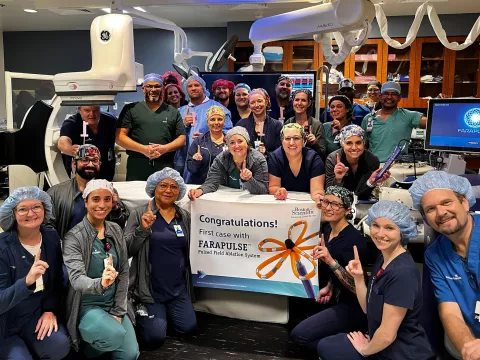- AdventHealth
Choose the health content that’s right for you, and get it delivered right in your inbox.
Molecular Pathways Involved in the Pathogenesis of Pancreatic Cancer: Role of Phytochemicals in Targeting the Clinical Outcomes
International Collaborative Research Chapter Published in a Book “Phytochemicals Targeting Tumor Microenvironment” by Springer Nature Switzerland AG
Sarfraz Ahmad, PhD
AdventHealth Cancer Institute
Link to bio: Sarfraz Ahmad | AdventHealth Cancer Institute
Bayarmaa Mandzhieva1, Rima Shobar1 , Anum Jalil 1 , Hammad Zafar1, Mamoon Ur Rashid1, Ranjeet Kumar1 , Akash Khetpal 2 , Sarfraz Ahmad3
1 Department of Internal Medicine, AdventHealth, Orlando, FL 32804; 2Dow University of Health Sciences, Karachi, Sindh 74200, Pakistan; 3AdventHealth Cancer Institute, Orlando, FL 32804
Pancreatic cancer is the fourth leading cause of cancer-related deaths in the U.S. Its high mortality is due to delayed diagnosis as it often produces minimal symptoms early in the disease. Surgical resection, radiation therapy and chemotherapy are essential treatment components. It is well known that chemotherapy options include gemcitabine monotherapy, 5-fluorouracil, leucovorin, irinotecan, and oxaliplatin (FOLFIRINOX) combination and the combination of gemcitabine plus albumin-bound (nab) paclitaxel. Despite these therapeutic options, the average 5-year survival rate continues to be less than 5%; therefore, more efficacious approaches need to be explored.
There are novel potential therapies under investigation such as immunotherapy and compounds from natural sources. Many recently published epidemiological studies have shown a strong association between phytochemicals and reduced incidence of cancers. This chapter is an overview of the current knowledge and the potential anti-cancer properties of various natural products, such as curcumin, benzyl isothiocyanate, capsaicin, resveratrol, and tea polyphenols. These findings lay the groundwork to support that there exist some association of anti-cancer properties of phytochemicals in the management of pancreatic malignancy.
There is a remaining gap in pre-clinical studies that compromises the use of phytochemicals in clinical practice. The inability to reproduce similar effectiveness of these agents in in vivo models, including animal and human studies, has been limited by numerous factors such as solubility, stability, lack of selectivity and mostly poor bioavailability which would require higher and more frequent doses in in vivo studies that may lead to side effects. Moreover, the activity of these agents gets compromised further by the methods of their extraction and purification processes.
Another aspect of using phytochemicals that has been considered a limitation is the lack of target specificity, but it has been more and more realized that such lack of specificity and multitargeted/pleiotropic effects of phytochemicals underline the indispensable quality of these anti-cancer agents. Additionally, combinations of the anti-cancer phytochemicals should be explored as they may be more effective than single agents alone. Continued efforts must be made toward the synthesis of novel analogues of phytochemicals to increase their bioavailability and efficacy, creation of formulations to selectively and more effectively deliver phytochemicals to their intended target organ/tissue, and lastly, formulation of innovative delivery systems that can improve the pharmacokinetics of anticancer agents.
The emergence of nanotechnology has expanded the horizon of anti-cancer therapy, including phytochemicals ’ use as anti-cancer agents. The utilization of biocompatible and biodegradable nanoparticles represents novel delivery strategies to improve solubility, stability and bioavailability of phytochemicals in pancreatic cancer.
Link to Book: https://www.springer.com/gp/book/9783030484040
Recent News
The AdventHealth Neuroscience Institute is the first in Florida and one of the first in the country to begin recruiting patients with primary progressive or non-active secondary progressive multiple...
Discover what’s being accomplished in Central Florida to bridge the health gap with Orange County Mayor Jerry Demings and AdventHealth’s Dr. Alric Simmonds.
Breakthrough device offers new hope for stroke survivors struggling with rehabilitation following ischemic stroke
The Convergent Hybrid Ablation procedure has been gaining acceptance as an effective treatment option for long-standing persistent atrial fibrillation (AFib) since the CONVERGE trial data published in...
Recently, AdventHealth for Children pediatric orthopedic surgeon Sean Keyes, DO, Katelyn Smith, PA-C, and their team performed their 100th bridge-enhanced anterior cruciate ligament (ACL) repair (BEAR...
AdventHealth recently began piloting a new Genomics Risk Assessment for Cancer and Early Detection (GRACE) program that combines the use of digital mammography, artificial intelligence (AI) technology...
AdventHealth Clinical Research Unit (CRU) Executive Director and Medical Director of Genitourinary Oncology Guru Sonpavde, MD, co-authored an article on the AMBASSADOR Phase III clinical trial results...
AdventHealth Research Institute is currently seeking physicians experiencing exhaustion, irritability, hopelessness, anxiety, work/home imbalance or similar burnout symptoms to participate in a...
A promising new treatment for AFib patients called Pulse Field Ablation is first offered in Central Florida at AdventHealth and shows less damage to tissue.
Plastic and Reconstructive Microsurgeon Sabrina Pavri, MD, and Breast Surgeon Devina McCray, MD, recently began offering immediate neurotization after breast reconstruction, a new surgical technique...
Explore the healing power of music for stroke survivors and their families in this episode of the Inspiring Wholeness podcast.
Dr. Andrew Weinfeld will be responsible for executing clinical and organizational strategy, improving clinical effectiveness and patient safety, and delivering exceptional patient experiences for the...












